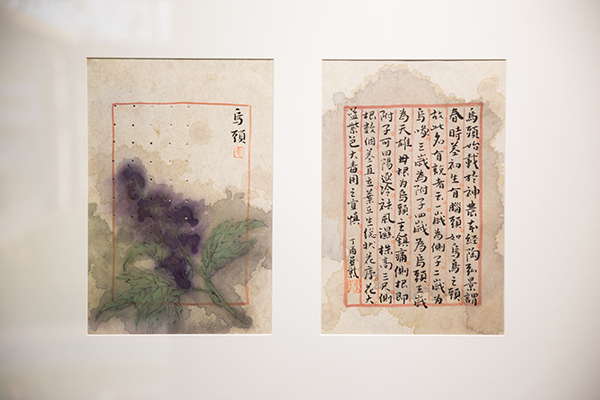Zhang Yanzi's ongoing show on herbs, happiness and healing
By Deng Zhangyu | China Daily | Updated: 2017-11-28 11:43

For instance, a herbal medicine used to treat chronic hepatitis is named Xiaoyaosan, which literally translates to "happiness medicine".
Zhang says ancient people were concerned with overall remedy rather than focusing on bodily treatment alone.
"In fact, to feel happy and to relieve pain are the same. You don't have to rely on things to bring you happiness. Our brain creates it," says the 50-year-old artist.
She also asked her friends what made them happy. The answers varied, she says. Some said mahjong (a Chinese board game), while others said cigarettes, smartphones, music, food, religion or books. The artist has translated the answers into her Prescription series by depicting such things on paper.
The Herb series includes many plants that are used in traditional medicine but also have hallucinogenic properties. For example, wormwood can help ease joint pain and also be made into a drink that can cause hallucinations.
Zhang's previous works and shows have also related to traditional medicine, which is why she was dubbed an "artist of healing" by some critics. She has depicted syringes, pills, stethoscopes and scalpels in her ink works.
Her concentration on such subjects goes back to 2000, when her husband became ill and her parents passed away one after the other. It brought her great sorrow and pain.
The reflection of pain has since been in the Beijing-based artist's works.
Zhang's last solo show in Beijing in 2013 was titled The Remedy, with more than 100 paintings exploring both physical and spiritual remedies.
As for the artist's take on "ecstasy", the title of her ongoing exhibition, she uses a poem written by the warlord and poet Cao Cao from the Three Kingdoms period (220-280). "The wine, the song, life goes on. But for how long? It evaporates, to our dismay. Like the morning dew, day after day."
If you go
10 am-6 pm, through Dec 28. Feefan's art gallery, 7 Dongsihuan Beilu, Chaoyang district, Beijing.
























